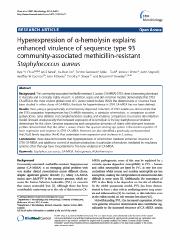Please use this identifier to cite or link to this item:
https://ahro.austin.org.au/austinjspui/handle/1/12076| Title: | Hyperexpression of α-hemolysin explains enhanced virulence of sequence type 93 community-associated methicillin-resistant Staphylococcus aureus. | Austin Authors: | Chua, Kyra Y L ;Monk, Ian R;Lin, Ya-Hsun;Seemann, Torsten;Tuck, Kellie L;Porter, Jessica L;Stepnell, Justin;Coombs, Geoffrey W;Davies, John K;Stinear, Timothy P;Howden, Benjamin P | Affiliation: | Department of Microbiology and Immunology, University of Melbourne, Melbourne, Victoria 3052, Australia Microbiology |
Issue Date: | 10-Feb-2014 | Publication information: | BMC Microbiology 2014; 14(): 31 | Abstract: | The community-associated methicillin-resistant S. aureus (CA-MRSA) ST93 clone is becoming dominant in Australia and is clinically highly virulent. In addition, sepsis and skin infection models demonstrate that ST93 CA-MRSA is the most virulent global clone of S. aureus tested to date. While the determinants of virulence have been studied in other clones of CA-MRSA, the basis for hypervirulence in ST93 CA-MRSA has not been defined.Here, using a geographically and temporally dispersed collection of ST93 isolates we demonstrate that the ST93 population hyperexpresses key CA-MRSA exotoxins, in particular α-hemolysin, in comparison to other global clones. Gene deletion and complementation studies, and virulence comparisons in a murine skin infection model, showed unequivocally that increased expression of α-hemolysin is the key staphylococcal virulence determinant for this clone. Genome sequencing and comparative genomics of strains with divergent exotoxin profiles demonstrated that, like other S. aureus clones, the quorum sensing agr system is the master regulator of toxin expression and virulence in ST93 CA-MRSA. However, we also identified a previously uncharacterized AraC/XylS family regulator (AryK) that potentiates toxin expression and virulence in S. aureus.These data demonstrate that hyperexpression of α-hemolysin mediates enhanced virulence in ST93 CA-MRSA, and additional control of exotoxin production, in particular α-hemolysin, mediated by regulatory systems other than agr have the potential to fine-tune virulence in CA-MRSA. | URI: | https://ahro.austin.org.au/austinjspui/handle/1/12076 | DOI: | 10.1186/1471-2180-14-31 | ORCID: | Journal: | BMC Microbiology | URL: | https://pubmed.ncbi.nlm.nih.gov/24512075 | Type: | Journal Article | Subjects: | Animals Australia Bacterial Toxins.biosynthesis.genetics Community-Acquired Infections.microbiology.pathology Disease Models, Animal Female Gene Deletion Gene Expression Gene Expression Regulation, Bacterial Genetic Complementation Test Genome, Bacterial Hemolysin Proteins.biosynthesis.genetics Humans Methicillin-Resistant Staphylococcus aureus.isolation & purification.pathogenicity Mice Mice, Inbred BALB C Sequence Analysis, DNA Staphylococcal Skin Infections.microbiology.pathology |
| Appears in Collections: | Journal articles |
Files in This Item:
| File | Description | Size | Format | |
|---|---|---|---|---|
| 24512075.pdf | 1.15 MB | Adobe PDF |  View/Open |
Page view(s)
56
checked on Nov 25, 2024
Download(s)
100
checked on Nov 25, 2024
Google ScholarTM
Check
Items in AHRO are protected by copyright, with all rights reserved, unless otherwise indicated.
